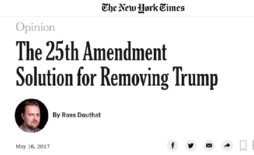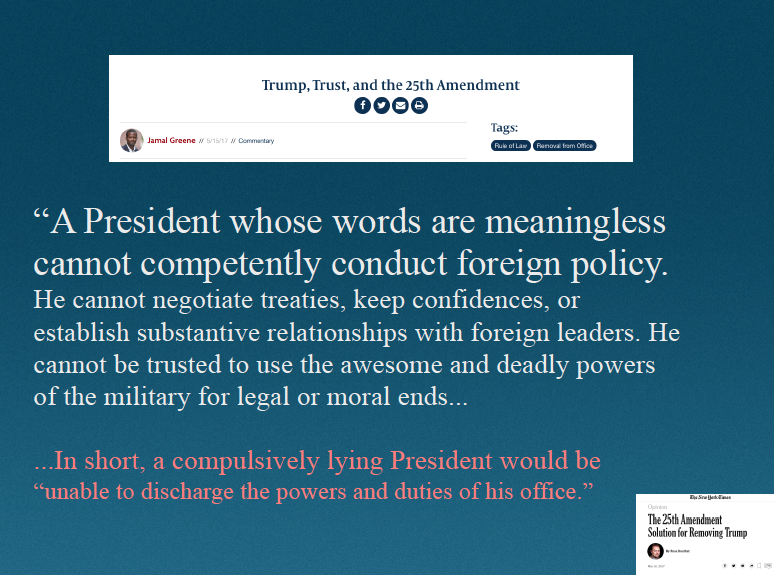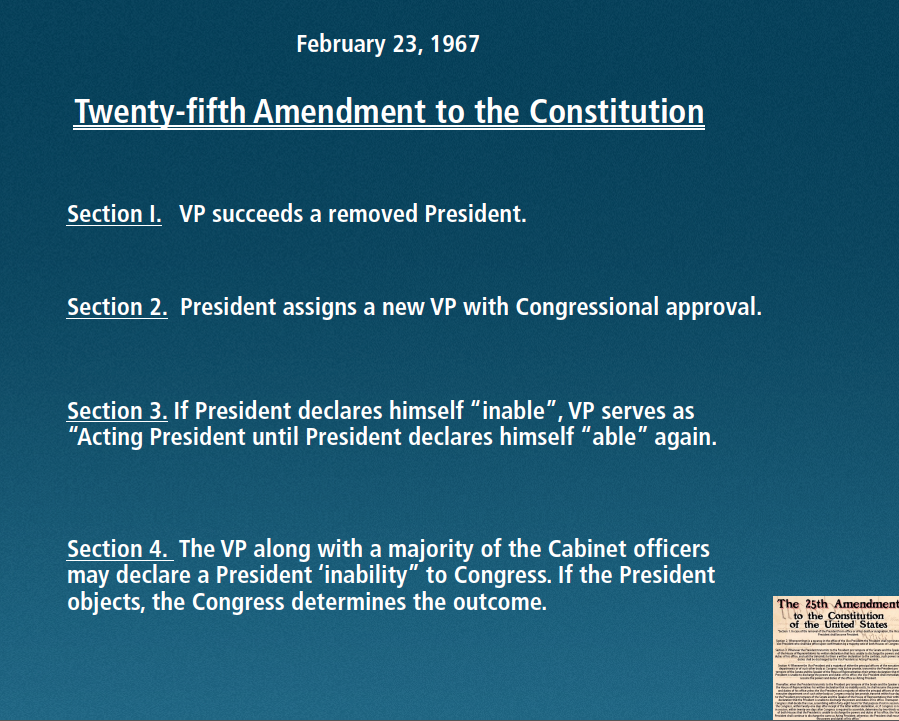Another Turn of the 25th Amendment – And Still Not The Answer For Trump’s Mental Illness.
Posted on | January 3, 2024 | 4 Comments
Mike Magee
On May 16, 2017 New York Times conservative columnist, Russ Douthat, wrote “The 25th Amendment Solution for Removing Trump.” That column was the starting point for a Spring course I taught on the 25th Amendment at the President’s College in Hartford, CT. I will not summarize the entire course here, but would like to emphasize four points:
- The American public was adequately warned (now 7 years ago) of the risk that Trump represented to our nation and our democracy.
- Douthat’s piece triggered a journalistic debate which I summarize below with four slides drawn from my lectures.
- Had Pence and the cabinet chosen to activate the 25th Amendment, as it is written, Trump would have had the right to appeal “his inability”, forcing the Congress to decide whether there was cause to remove the President.
- Judging from the later impeachment of Trump in the House, but failure to convict in the Senate, it is unlikely a courageous Pence and Cabinet would have been backed by their own party.
Let’s look at four archived slides from the 2017 lecture, and then discuss our current options in the case of 2024 Trump against Democracy.
Slide 1. Russ Douthat
In 2017, Scott Bomboy, chief of the National Constitution Center, wrote:
“Section 4 is the most controversial part of the 25th Amendment: It allows the Vice President and either the Cabinet, or a body approved ‘by law’ formed by Congress, to jointly agree that ‘the President is unable to discharge the powers and duties of his office.’ This clause was designed to deal with a situation where an incapacitated President couldn’t tell Congress that the Vice President needed to act as President.”
“It also allows the President to protest such a decision, and for two-thirds of Congress to decide in the end if the President is unable to serve due to a condition perceived by the Vice President, and either the Cabinet or a body approved by Congress. So the Cabinet, on its own, can’t block a President from using his or her powers if the President objects in writing. Congress would settle that dispute and the Vice President is the key actor in the process.” What might have been (but was not) would have played out this way according to Constitutional scholars:
“… scholars Brian C. Kalt and David Pozen explain the problematic process if the Vice President and the Cabinet agree the President can’t serve.”
- “If this group declares a President ‘unable to discharge the powers and duties of his office,’ the Vice President immediately becomes Acting President.
- If and when the President pronounces himself able, the deciding group has four days to disagree.
- If it does not, the President retakes his powers.
- But if it does, the Vice President keeps control while Congress quickly meets and makes a decision…
- The Vice President continues acting as President only if two-thirds majorities of both chambers agree that the President is unable to serve.”
Had our leaders followed Russ Douthat’s advice seven years ago, it is highly unlikely that a 2/3rds majority of both chambers of Congress would have had their back. Instead, they went for Impeachment and failed, as Republicans chose rather to let voters decide. And they did, in 2020. Few likely envisioned that mentally deranged (now former President) would launch a January 6th insurrection, embolden white nationalists militia across the nation, and follow thru on threats to run and win a 2nd term in 2024, and then free his followers from jail cells, only to be filled with those who attempted to hold him accountable for his historic misdeeds. The 25th Amendment is no more a solution today than it was in 2017. Instead citizens loyal to our form of government, rely in 2024 on two protective backstops:
- Our third pillar of government – The Courts (most especially the Supreme Court.
- The voter, whose second day of reckoning fast approaches.
Some believe we are once again engaged in a great Civil War. In its’ summary of the Gettysburg Address, National Geographic states that “Despite (or perhaps because of) its brevity, since (Abraham Lincoln’s) speech was delivered, it has come to be recognized as one of the most powerful statements in the English language and, in fact, one of the most important expressions of freedom and liberty in any language.”
The last paragraph of that two minute speech, delivered now 180 years and two months ago, reminds us that Americans died on “the battlefield” on January 6, 2021 defending our democratic government, and Lincoln’s words are today, more relevant than ever.
As described by historians, Lincoln made it clear that the stakes could not have been higher, well before the Dobbs decision and the appropriation of Hitler’s words by Trump. “Lincoln tied the current struggle to the days of the signing of the Declaration of Independence, speaking of the principles that the nation was conceived in: liberty and the proposition that all men are created equal. Moreover, he tied both to the abolition of slavery—a new birth of freedom—and the maintenance of representative government.
As they were spoken, November 19, 1863, here are Lincoln’s final words, ones that deserve a most careful reading: “It is for us the living, rather, to be dedicated here to the unfinished work which they who fought here have thus far so nobly advanced. It is rather for us to be here dedicated to the great task remaining before us—that from these honored dead we take increased devotion to that cause for which they here gave the last full measure of devotion—that we here highly resolve that these dead shall not have died in vain—that this nation, under God, shall have a new birth of freedom, and that government of the people, by the people, for the people, shall not perish from the earth.”
Tags: Democracy > Dobbs decision > Trump and Hitler > Womens Rights
Comments
4 Responses to “Another Turn of the 25th Amendment – And Still Not The Answer For Trump’s Mental Illness.”








January 4th, 2024 @ 9:33 am
Thanks Mike for this.
I would only add that us voters in 2024 may be faced with the unhappy choice between a questionably mentally, but certainly legally unfit former president, and a questionably mentally, but certainly morally and legally unfit current president (i.e. complicit in genocide). The former belongs in a U.S. slammer, and the latter in The Hague slammer.
My lord – what have we come to?!
January 4th, 2024 @ 10:01 am
Thanks, Larry. We are where we are. Choices must be made. Standing on the sideline seems untenable if Democracy is to survive. Best, Mike
January 4th, 2024 @ 5:16 pm
This is the first time that I have read a description of DJT as mentally ill. Of course he is! Perhaps with more widespread use of this diagnosis, fewer of his supporters will vote for him. (But maybe not, because the label fits many of them as well .)
January 6th, 2024 @ 8:52 am
Thanks, Nancy. I think we are at a point, now these many years later, where Trump’s mental illness is undeniable to most. Those who continue to support his candidacy now do so despite the risk to all of us, and for their own personal gain. There remain a few on the religious right who honestly believe that “God put Trump here for a purpose” (to support patriarchy etc.) Divine instrumentation was part of the immoral justification in both Germany and Japan during WW II as well. That did not end well for the citizens of either nation.